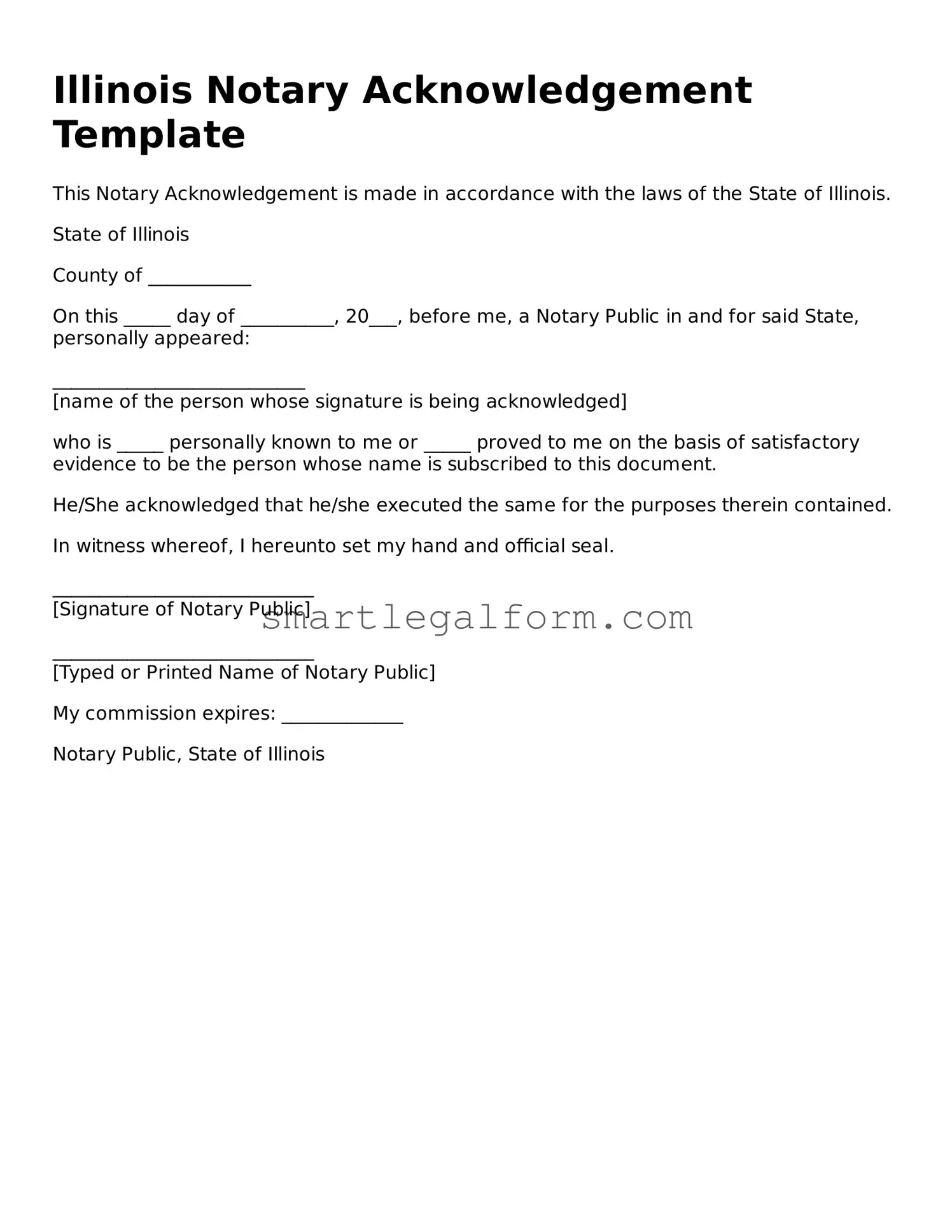Printable Illinois Notary Acknowledgement Document
Form Preview Example
Illinois Notary Acknowledgement Template
This Notary Acknowledgement is made in accordance with the laws of the State of Illinois.
State of Illinois
County of ___________
On this _____ day of __________, 20___, before me, a Notary Public in and for said State, personally appeared:
___________________________
[name of the person whose signature is being acknowledged]
who is _____ personally known to me or _____ proved to me on the basis of satisfactory evidence to be the person whose name is subscribed to this document.
He/She acknowledged that he/she executed the same for the purposes therein contained.
In witness whereof, I hereunto set my hand and official seal.
____________________________
[Signature of Notary Public]
____________________________
[Typed or Printed Name of Notary Public]
My commission expires: _____________
Notary Public, State of Illinois
Common mistakes
Filling out the Illinois Notary Acknowledgement form can seem straightforward, but many people make common mistakes that can lead to delays or rejections. One frequent error is failing to include the correct date. The date is essential because it indicates when the notary's acknowledgment took place. If you forget to write it down or write an incorrect date, it can render the document invalid.
Another common mistake involves the signer’s name. It’s crucial to ensure that the name provided matches the name on the identification presented to the notary. If there are discrepancies, even minor ones, the notary may refuse to complete the acknowledgment. Always double-check the spelling and format of the name before submitting the form.
People often overlook the notary's signature and seal. The notary must sign and affix their official seal on the acknowledgment form for it to be valid. If either of these elements is missing, the document will not hold up in legal situations. It’s a good practice to verify that the notary has completed this step before leaving their office.
Lastly, some individuals neglect to provide the correct type of identification to the notary. Illinois law requires that the signer present a valid form of ID, such as a driver’s license or passport. If the ID does not meet the requirements or is expired, the notary cannot proceed with the acknowledgment. Always ensure you bring an acceptable form of identification to avoid any issues.
Dos and Don'ts
When filling out the Illinois Notary Acknowledgement form, it’s important to follow certain guidelines to ensure that the document is completed correctly. Here are five things you should and shouldn't do:
- Do ensure that all parties involved are present when the form is being signed.
- Don't sign the form without verifying the identity of the individuals involved.
- Do use clear and legible handwriting to fill out the form.
- Don't make any alterations or corrections on the form after it has been signed.
- Do keep a record of the notarization for your own files.
By adhering to these guidelines, you can help ensure that the notary process goes smoothly and that the document holds up under scrutiny.
Other Notary Acknowledgement State Forms
Individual Acknowledgement Notary Form - Could be a requirement for government filings.
Renew Notary Ohio - A Notary Acknowledgment can provide peace of mind in transactions.
Jurat Form Florida 2023 - A Notary Acknowledgment can often be found in public record systems.
When entering into agreements that involve potential risks, understanding the nuances of a Hold Harmless Agreement form is essential for both parties. In Florida, this legal document serves as a critical safeguard, transferring liability and ensuring that one party is not held accountable for unforeseen damages. It is instrumental in settings like construction projects or special events, where the stakes can be high. For those seeking more information or templates related to these agreements, visiting TopTemplates.info can provide valuable resources.
Notary Template Word - A notary acknowledgment verifies the identity of a signer.
Similar forms
-
Affidavit: An affidavit is a written statement confirmed by oath or affirmation. Like a notary acknowledgment, it requires the signer to declare the truth of the contents in front of a notary public, ensuring authenticity and legal validity.
-
Power of Attorney: A power of attorney document grants someone the authority to act on another's behalf. Similar to a notary acknowledgment, it often requires notarization to verify that the principal (the person granting authority) is willingly and knowingly signing the document.
- Employee Handbook: For a comprehensive understanding of workplace expectations, refer to our detailed Employee Handbook guidelines to ensure clarity and compliance with company policies.
-
Deed: A deed is a legal document that transfers property ownership. Notarization is typically required for deeds to ensure that the signatures are genuine and that the parties involved understand the transaction, paralleling the purpose of a notary acknowledgment.
-
Contract: Certain contracts, especially those involving significant transactions, may require notarization. This process serves to confirm that all parties have signed willingly and are aware of the contract's implications, much like a notary acknowledgment.
-
Will: A will outlines how a person's assets will be distributed after their death. While not always required, notarizing a will can add an extra layer of verification, similar to the notary acknowledgment, ensuring that the testator's intentions are clearly understood and documented.
-
Loan Documents: When applying for a loan, various documents must be signed and often notarized. This process helps to verify the identity of the signer and the authenticity of the agreement, akin to the function of a notary acknowledgment.
